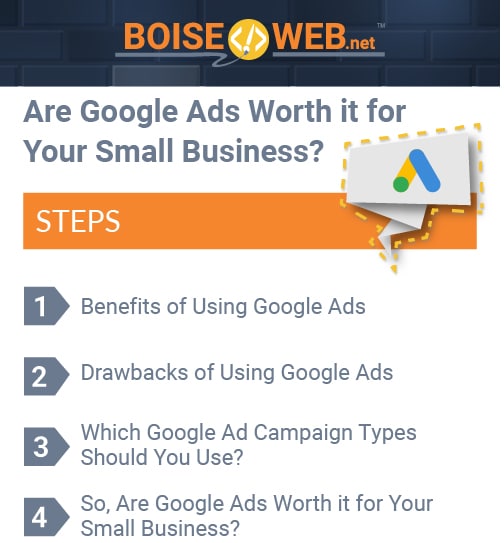Advertising is one of the most essential tools for small businesses to use to get their brand noticed by potential customers. One of the most popular advertising methods is Google Ads, an online platform that allows businesses to create and display ads to Google users.
Many small business owners wonder if Google Ads are worth it for their business. In this article, we’ll examine the benefits and drawbacks of Google Ads and help you answer the question of whether or not Google Ads are worth it for your small business.
Benefits of Using Google Ads
Google Ads can offer many benefits for small businesses looking to increase their online visibility and reach potential customers. Some of the key benefits include:
1. Targeted advertising
Google Ads allow you to target specific geographic locations, keywords, interests, or demographics with your ads. This can help you to reach the right audiences and increases the chance of conversions and higher returns on investment.
2. Cost-effective
With Google Ads, you control your advertising costs and can ensure that your budget is being spent effectively. You can change your budgeting strategy, set your daily maximum spend, and can monitor how your funds are being allocated.
3. Measurable results
Google Ads provides you with detailed reports and analytics, allowing you to measure to the performance of your ads. These reports and analytics can help you make data-driven decision to optimize your campaigns and achieve better results.
4. Quick and easy to set up
Creating and launching your Google Ads campaigns is relatively quick, easy, and straightforward. You can have ads up and running within minutes, allowing you to start driving traffic and generating leads in no time.
5. Increased brand awareness
Even if users don’t click on your ads, they will still see your brand. This not only helps increase brand awareness, but it also increases recognition and trustworthiness for your business. Customers are more likely to make a purchase from a company that they know and trust.
6. Level playing field
Google Ads can level the playing field for small businesses, allowing them to compete with larger companies. Even against competitors with much larger advertising budgets, you can get your ads in front of customers and increase your reach.
Overall, Google Ads can be an effective and cost-efficient way for small businesses to increase their online visibility, generate leads, and drive sales.
Drawbacks of Using Google Ads
While Google Ads can be a highly effective marketing tool for small businesses, there are also some potential drawbacks to consider. Some of the main drawbacks to consider are:
1. Cost
Depending on your industry and target keywords, the cost-per-click on Google Ads can be quite high. This can make it difficult for small businesses to compete with larger companies since they often have limited resources and smaller budgets.
2. Complexity
Google Ads can be complex and overwhelming for small business owners who are not familiar with the platform. While ads aren’t overly complicated to set up, it takes time, expertise, and ongoing management to make sure your campaigns are effective.
3. Competition
Industries that are highly saturated and competitive can often make it difficult for your ads to be seen. There may be steep competition on the keywords you’re targeting. This makes the cost-per-click go up and makes your ads stand out less.
4. Ad Blindness
Many users have developed ad blindness due to the overwhelming amount of advertising present in our daily lives. This means they are less likely to click on ads and may skip over them in search results to view the organic results.
5. Fraudulent clicks
Click fraud is a potential issue with Google Ads, as some competitors or bots may intentionally click on your ads to deplete your advertising budget.
Overall, while there are potential drawbacks to using Google Ads for small businesses, these can be mitigated by carefully planning and optimizing your campaigns, monitoring their performance, and adjusting your strategy as needed. It’s important to weigh the potential benefits against the drawbacks to determine if Google Ads is the right marketing tool for your small business.
Which Google Ad Campaign Types Should You Use?
There are several Google Ads campaign types that can be effective for small businesses, depending on their goals and target audience. Here are some of the most popular campaign types:
1. Search Ads
Search Ads are the most common type of Google Ads and are ideal for small businesses looking to drive website traffic and generate leads. Search Ads appear at the top of Google search results when users search for specific keywords related to your business.
2. Display Ads
Display Ads are banner ads that appear on websites that are part of the Google Display Network. They can be an effective way to increase brand awareness and reach a wider audience.
3. Video Ads
Video Ads are short ads that play before or during YouTube videos. They can be an effective way to engage with a younger audience and increase brand awareness.
4. Shopping Ads
Shopping Ads are ideal for e-commerce businesses and allow you to showcase your products at the top of Google search results when users search for specific products.
5. Local Ads
Local Ads are designed for businesses with a physical location and are ideal for small businesses looking to drive foot traffic and increase local sales. Local Ads appear at the top of Google Maps when users search for specific keywords related to your business.
Overall, the best Google Ads campaign type for your small business will depend on your specific goals and target audience. It’s important to do your research and test different campaign types to determine which ones are most effective for your business.
So, Are Google Ads Worth it for Your Small Business?
Google Ads can be a highly effective tool for small businesses looking to increase their online visibility and drive traffic to their website. However, whether Google Ads are worth it for your small business depends on several factors, such as your industry, target audience, and budget.
If your target audience is actively searching for your products or services on Google, and you have a well-optimized website with a clear call-to-action, Google Ads can be an excellent way to get in front of potential customers at the moment they are most likely to make a purchase.
However, if your industry is highly competitive, and the cost-per-click for your target keywords is high, you may find that Google Ads are not cost-effective for your small business. In this case, you may want to consider other marketing strategies, such as social media advertising or content marketing.
Ultimately, whether Google Ads are worth it for your small business depends on your specific goals, budget, and industry. It’s important to do your research, set clear goals, and continually evaluate the performance of your ads to determine if they are delivering a positive return on investment.
In conclusion, Google Ads can be an effective advertising tool for small businesses looking to increase their brand visibility and attract new customers. However, businesses need to carefully consider the benefits and drawbacks of Google Ads before investing their time and money.
If used correctly, Google Ads can provide a cost-effective and targeted advertising strategy that delivers measurable results. However, it is essential to be aware of the competition, complexity, and click fraud issues that may arise while using Google Ads. Overall, it is recommended that small businesses consult with a digital marketing expert to determine whether Google Ads is the right choice for their business.
To get started on your Google Ads campaigns today, contact us at [email protected]. We are experts in Google Ads marketing and can make your Google Ads campaigns as successful as possible.
The author generated this text in part with GPT-3, OpenAI’s large-scale language-generation model. Upon generating draft language, the author reviewed, edited, and revised the language to their own liking and takes ultimate responsibility for the content of this publication.


